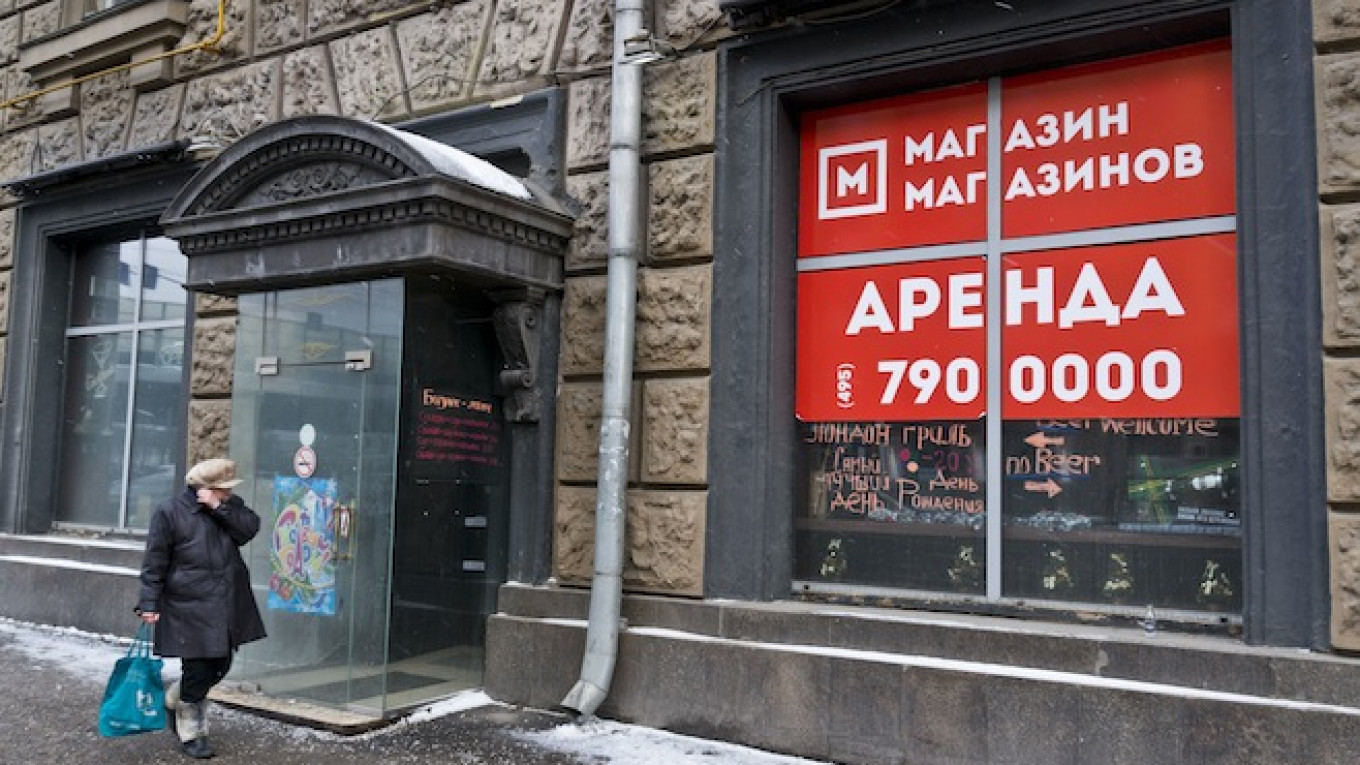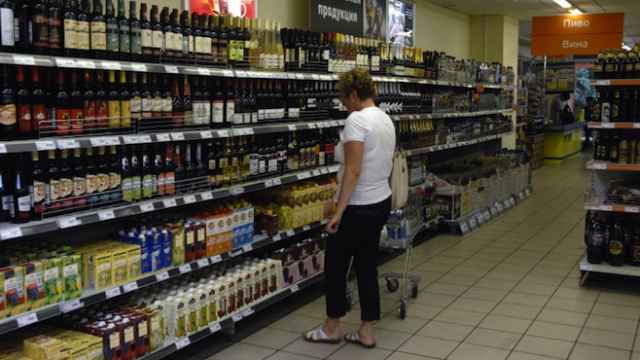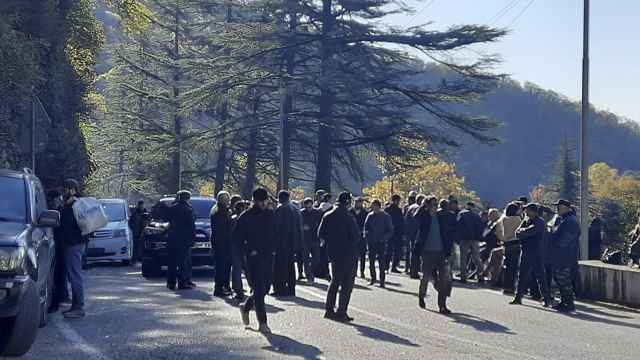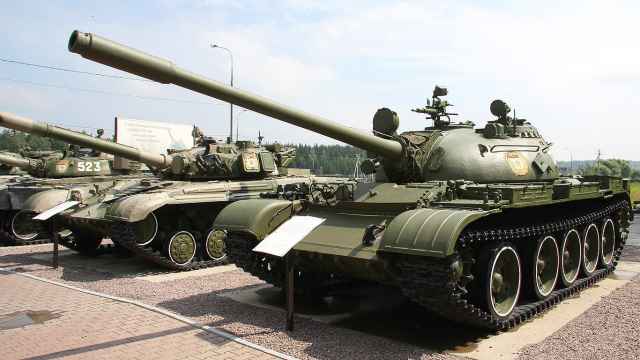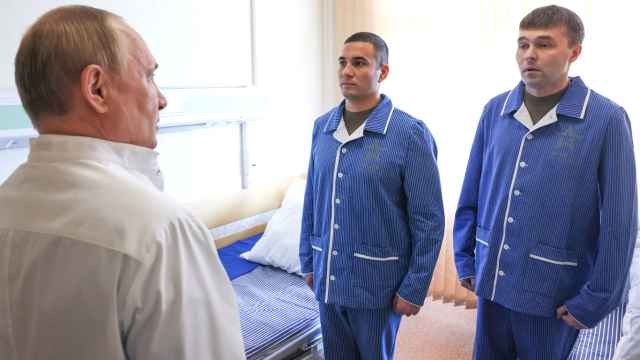Moscow's swankiest streets are blooming with cherry red "For Rent" signs as retailers flee their flagship stores for cheaper rents elsewhere amid Russia's growing economic crisis.
Street retail vacancy rates in the capital will likely climb to 12 to 15 percent this year from 8.2 percent in 2014 with the most prestigious areas taking the hardest hit, according to a report by the Russian branch of U.S. real estate giant CBRE.
"Traditionally expensive streets have seen the greatest growth in vacancies," said Konstantin Kovalev, managing partner at elite Moscow-based real estate consulting company Blackwood.
Retailers are reacting to Russia's weakening economy, which is expected to contract up to 5 percent this year. Consumer demand is being squeezed by a year-on-year inflation rate that hit 15 percent in January and the ruble's fall of more than 50 percent against the U.S. dollar since last summer on the back of low oil prices and Western sanctions.
Prestigious Tverskaya Ulitsa, a spacious boulevard leading down to the Kremlin, saw its vacancy rate rise from 1.7 percent in 2013 to 7.5 percent by the fourth quarter of last year, according to Blackwood.
The average prime street retail rate will likely drop from $7,000 per square foot to $6,500-6,000, according to CBRE.
The weak economic outlook and worsening international political situation have already pushed some foreign brands to leave Russia. Finnish department chain Stockmann said it would shutter 16 Seppala fashion stores last year while prominent clothing retailers, including Esprit, New Look and River Island have also announced plans to close their operations in Russia.
Adidas, Samsung and Sportmaster have all announced plans to roll back planned expansions slated for this year.
Those that remain must contend with rents that have nearly doubled due to the largely dollar-denominated leases of Moscow's center's retail market.
In December, fast fashion retailer Zara shuttered its two-story flagship store on Tverskaya — the reported $3 million monthly rent being the deciding factor, according to news website Afisha-Gorod. The chain currently has 24 stores in Moscow, mostly in shopping centers according to the company's website.
Chains planning on staying may now focus on their most profitable stores, typically in shopping malls, said Maxim Palt, senior consultant at CBRE. This may also drive vacancy rates in Moscow's center, as malls draw chains off the streets with better rental terms, including "rent vacations" or rental rates pegged to a ruble corridor, he added.
Moscow's recently created pedestrian-only zones, which typically cater to international luxury brands, are likely to see their vacancy rates rise, said CBRE's Palt.
"The situation for luxury brands is quite difficult, because they can't afford to move to a normal shopping center to lower expenses on rent, for example. They need to maintain their image," he said.
Moscow does have several luxury-focused malls, but they are already at full occupancy, Palt added.
The situation could be even worse, though. While Blackwood expects retail in the city center and top malls to hover between 5 and 10 percent vacancy rates, the real estate agency sees up to 30 percent vacancy rates in less prestigious spots.
"For less popular establishments that have some sort of flaw in their conception or are out-of-date, one can expect a 15 to 30 percent vacancy rate," said Blackwood's Kovalev in a press release issued last week.
Contact the author at s.skove@imedia.ru
A Message from The Moscow Times:
Dear readers,
We are facing unprecedented challenges. Russia's Prosecutor General's Office has designated The Moscow Times as an "undesirable" organization, criminalizing our work and putting our staff at risk of prosecution. This follows our earlier unjust labeling as a "foreign agent."
These actions are direct attempts to silence independent journalism in Russia. The authorities claim our work "discredits the decisions of the Russian leadership." We see things differently: we strive to provide accurate, unbiased reporting on Russia.
We, the journalists of The Moscow Times, refuse to be silenced. But to continue our work, we need your help.
Your support, no matter how small, makes a world of difference. If you can, please support us monthly starting from just $2. It's quick to set up, and every contribution makes a significant impact.
By supporting The Moscow Times, you're defending open, independent journalism in the face of repression. Thank you for standing with us.
Remind me later.


